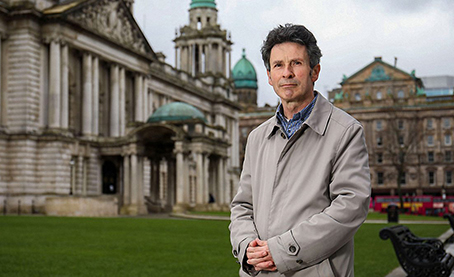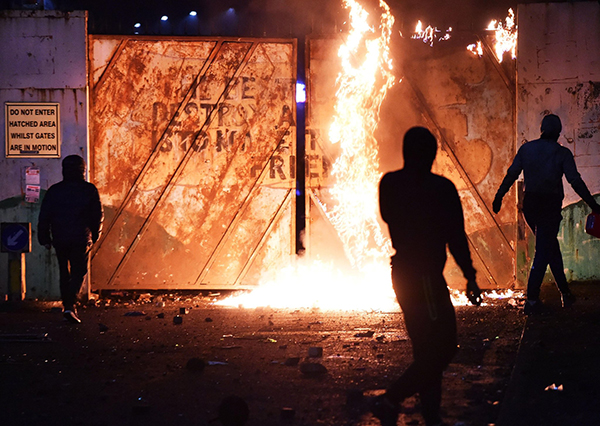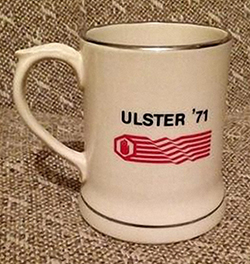Spotlight: A contested centenary
Published in Issue 4 (July/August 2021), Reviews, Volume 29BBC Northern Ireland, 20 April 2021
By Donal Fallon

Above: Presenter Mark Devenport outside Belfast’s City Hall.
On the announcement of his departure as BBC Northern Ireland’s political editor late last year, Mark Devenport joked that it felt ‘like attending your own funeral without any of the downsides’. Devenport’s tenure in journalism was impressive. Joining BBC Northern Ireland in 1986, as a reporter—and later editor—he covered many of the defining moments of the later stages of the conflict and the subsequent Peace Process.
This was a programme as much about the future as the past, with interesting cross-border polling on a range of questions around Northern Ireland’s position in the United Kingdom. If its observation on opinion in Ireland today was its strength, however, its uneven and potted history was undoubtedly its weakness.
Much as centenary coverage of the Easter Rising often drew parallels with its golden jubilee in 1966, Devenport’s Spotlight opens with rich archival footage of ULSTER 71—followed almost immediately by footage of rioting that occurred 50 years later, a fortnight before the airing of the programme. Devenport’s exploration of the Northern state focuses on three years—1921, 1971 and 2021—and posed three fundamental questions. Where did the state come from? How has it defined itself? Where is it going?
The programme is at its strongest in discussing the birth of the state. In Marie Coleman, Joe Baker, Paul Bew, Eamon Phoenix and Diarmaid Ferriter we have a line-up of authoritative historians, though we hear little from them. It is Phoenix who talks us through the brutal killings of the Catholic McMahon family, a deeply shocking event that garnered unwanted international headlines for the new state. Owen McMahon, a successful Belfast businessman and a director of Glentoran Football Club, was a largely apolitical figure whose family were targeted in what came to be called ‘the most terrible assassination that has yet stained the name of Belfast’ in March 1922. This sectarian murder was compared with the equally meaningless deaths of Thomas and Elizabeth Crozier, shot dead in Altnaveigh, near Newry, in June 1922 by the IRA amidst worsening reprisals.
Remarkably, in interviewing the granddaughter of the Croziers, Davenport discovered that she had also lost a relation in the Kingsmill massacre of January 1976. This intergenerational grief, and the manner in which the conflict could revisit families, was a theme that re-emerged throughout. We also meet Peter Heathwood, left paralysed after being shot in 1979 by a loyalist gunman in a case of mistaken identity, who is a relation of Thomas Heathwood, a seventeen-year-old shot dead by a sniper in March 1922. There is great emotional power in the stories of people whose own lives have been affected by the violence of the more recent conflict in discussing the events of decades earlier.
The point is well made—Northern Ireland is ultimately a small place, geographically and in terms of community, and everyone there knows the effects of violence. What is absent from the historical narrative, however, is any real analysis of the Northern Irish state historically, its governance, social and political agitation within it, and its shifting relationships with London and Dublin. We learn much of the human cost of violence and its lasting impact on families, but little of how Northern Ireland has changed or evolved on a political level.

Above: Rioting at the ‘peace wall’ gates at Lanark Way, West Belfast, on 7 April 2021, a fortnight before the airing of this programme. (Pacemaker)
At its halfway point, we are first introduced to the findings of a recent LucidTalk poll, conducted on the weekend of 5–7 April. Polling results are presented, first from Northern Ireland and then the Republic, which reflect the current political pessimism. In the North, 76% of those polled answered ‘Yes’ to the question ‘Could violence return?’, while in the Republic this stood at 87%.
Devenport is clearly interested in questions of memory and identity, and in the intersections of past and present. Archival footage of a young reporter covering the marching season shows him asking the viewer ‘Are the commemorations and re-enactments really about the past, or are they simply vehicles for expressing passionately held views about what’s happening here and now?’ He emphasises the desire of the UK government that 2021 be a celebration of ‘sports stars and other remarkable people from Northern Ireland’, yet when contributions from politicians begin it is immediately clear that any apolitical centenary—a celebration of boxers, poets and footballers—is something of an impossibility. Perhaps the most surprising finding of the LucidTalk poll concerns the question ‘Should Northern Ireland’s centenary be celebrated?’ While a predictable majority in the Republic believed not, in Northern Ireland 45% of those polled said ‘No’. Only 40% believed that the centenary of the state should be celebrated.

Above: Merchandise bearing the ULSTER ’71 logo.
One interesting dimension of the programme, likely to interest future historians examining the broad impacts of the pandemic on Irish life, is its footage of the Ulster Bands Forum and the ‘virtual band parades’ of the marching season in lockdown. Yet it was the Northern Ireland Protocol, and the ramifications of Brexit, which in time pushed the pandemic from the front pages once more. Those questions dominate the conclusion of this Spotlight, as the taoiseach informs Devenport that the current situation is ‘not a danger to the constitutional position of Northern Ireland at all, and was never intended to be’. Not unlike Ulster unionists a century ago, there is deep unease among the contributors from within unionism at aspects of London policy and decision-making in recent times. The greatest current threat to Ulster’s Britishness, they seem to uniformly feel, is British politicians. On the question of the Northern Ireland Protocol, 48% of those polled in the North felt that it should be scrapped, while 46% disagreed with that proposal.
The point is made that, as demographic shifts continue and as a new census looms, ‘we may end up in the centenary of the state … in the ironic position where a state that was created in order to ensure a permanent majority of Protestants may end up with Protestants in the minority’. Likewise, however, it is unlikely that any census will reveal an outright majority of Catholics, with the most likely outcome being two communities of 45–48%. Identity in the North is today more complex than orange and green, of course, and fears about a centenary that could instigate violence—not for the first time—were largely proven wrong. Ultimately, Devenport’s exploration of Northern Ireland offers much more for us to ponder concerning the future than the past.
Donal Fallon is a historian and presenter of the ‘Three Castles Burning’ historical podcast.
















